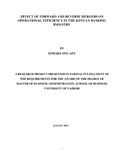| dc.description.abstract | Banks as is for every other firm use mergers as means of attaining higher performance which is the ultimate goal for all entrepreneurs. The objective of this study was to determine the effect of forward and reverse mergers on operational efficiency in the Kenyan banking industry. The independent variables under study were increased capital base, increase market share and cost efficiency. The type of research design employed in the study was causal study since it relied on control factors. This helped us to establish whether the many mergers that have happened in Kenyan banking sector have resulted in improved operational efficiency .The study surveyed the merged
banks within the period of study; the population of the study consisted of 34 banks that merged in the period 1996 to 2014 in Kenya. Secondary sources of data from the audited annual financial reports for four years before and after the mergers were used to analyze changes in the independent variables. Capital Adequacy ratios, Return on Capital Employed ratio, Cost Efficiency ratio and percentage change in Market Share were useful in this analysis. Descriptive statistics was used to explain the set-up of the study sample while Regression and Correlation analyses were used to explain the relationship between the variables. The study revealed that both forward and reverse mergers do not have a significant effect on operational efficiency. The independent variables in the study explain up-to 9% of the impact on operational efficiency. The research also revealed a weak positive correlation between operational efficiency and the independent variables. The correlation values recorded were 0.517, 0.561, 0.355 and 0.618 for Capital Adequacy, Return on Capital Adequacy and Cost Efficiency respectively. The study concluded that operational efficiency in commercial banks
improve in both forward and reverse mergers. However, other factors such as staff expertise, cost management marketing and corporate governance enhance the success of mergers. | en_US |

